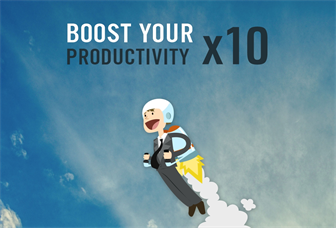
From Rookie To Pro: Essential Rules For Success In Blue Collar
SQI Security Entrepreneur Series 24
The Ultimate Guide To Excelling In Blue Collar As A Young Professional
As a blue-collar worker, standing out and advancing in a competitive industry is crucial for success. Here are 16 ways to get ahead and make yourself stand out in the competitive blue-collar world.
Set A Game Plan
One factor which all successful people have in common is effective time management. You may prefer to call it structure, setting yourself to the task, or a game-plan. Whichever word or term works for you is fine.
As long as you take it seriously, and put it into practice, you are creating one of the basic principles of productivity. It might be a good idea to think about this, and why this factor is so essential to success.
Perhaps you can begin by thinking of the opposite– ways which do not work. Even if you have one very small task to complete, if you do not manage your time appropriately it may get done too late, or not at all.
You may be working on a deadline, or have a task which does not have a specific time to be completed. If you do not have a game-plan for getting it done, the results will not be satisfying. While procrastination and wasting time impede productivity, lack of effective time-management can be as destructive.
Increasing your productivity and getting things done means having a good game-plan. First, you need to know exactly what must be done. Second, even if you do not have a specific deadline, you must also decide when it must be done. The third step is putting yourself to the task of doing it.
Reduce Distractions working as a team
There are few things which block productivity as fast and as surely as distractions. When you cannot concentrate and focus properly, you cannot get things done. Even if you do accomplish something, it can feel stressful and frustrating.
Whether you are on the job or at school, reducing the distractions which influence your ability to be productive will help you to get more done. There are two key points which you should keep in mind when you are planning to reduce the distractions in your environment.
The first point is what works for you and what works for someone else may be entirely different. The second point is unless you have examined your habits, you may not be one hundred percent certain about the habits that are the most effective for you.
The good news is it does not require much time or effort to consider how your habits are affecting your productivity, and begin to adjust them accordingly. If you are like most people these days, multi-tasking has become a part of your everyday life and your everyday vocabulary. There may be a number of things which you need to do in one day, and you may be doing them simultaneously. If you overdo multitasking, there can be two.
The same can be said about distractions. Attempting to do a job– and to do it correctly and well– will not net satisfactory results if distractions are allowed to get in the way. Working while listening to music, watching television, or chatting on the phone are not limited to teens.
Many adults do these things in their home offices, and even in an office which is occupied by other people. Perhaps they help your concentration– but they can just as easily ruin your concentration, and distract you from what you are doing. Becoming more productive takes a little analyzing of your habits. You can turn off some or all of these distractions, and see if you are better able to focus on the task at hand.
You may find that you can get the job done better, faster, and more effectively, without any distractions at all. On the other hand, you may find that one of these factors actually does aid in your concentration and focus. While finding whatever works for you is easy if you work on your own, it can be a little more complicated if you work with others.
You may find that coworkers who constantly use their phones, visit, or play their radios near your workspace distract you from focusing on your job. If you approach them politely, this may be all it takes to reduce the distractions so you can concentrate on your job.

What Should You Do 1st
If you think about back when you were in school, you may remember teachers telling you that the best way to approach homework and other projects was to do the hardest task first.
They may have also advised you to tackle the homework subject you disliked the most first, before moving on. This same approach can greatly enhance your productivity today. When you are preparing to begin a fresh day at work, try to begin putting this approach into action. Instead of beginning with a task you enjoy, or one which comes easily to you, start with one you dislike, or one which you feel will be quite difficult.
At the end of the day, you may be pleasantly surprised with how much you have accomplished. You will also feel that the day has gone much smoother. One reason for this is at the start of your work day you will have more energy. When you devote this energy to the hardest or most disliked tasks, you will not feel as drained or frustrated in doing them.
A second reason is if you begin with tasks you enjoy, you often find yourself looking ahead to the ones you dislike in a very negative manner. Instead of enjoying the easier tasks while you are doing them, you are dreading the ones ahead. When you do the hardest ones first, you will not only have more energy left for the rest of the day, you will also appreciate the other tasks more when you get to them.
This approach will increase your productivity. When you do not look at your work day as a long, uphill battle, you will get more accomplished. Getting the tasks you dislike out of the way first, early in the day, will generate better results with all of your tasks.
Not only will you get more done, you will be much more satisfied with the outcome of each and every task. While it is only human nature to want to do what you like first, having the harder things on the horizon can slow you down and drain your energy.
If you want to be more productive, and achieve the very best results in everything you do, take the advice from your school teachers and tackle the hardest jobs first. Your productivity will increase, and you will end each day with a refreshing feeling of accomplishment.

Exercise Self – Discipline
Self-discipline is an essential factor for productivity and success. Without it, one becomes lazy, unmotivated, and dependent upon others. Lack of self discipline also makes for a difficult-to-deal-with employee, boss, or coworker Exercising self-discipline means, in an old-fashioned term, setting yourself to a task.
You need to know what must be done, when it must be done– and do it. Good self-discipline includes a basic schedule, or framework, of what needs to be accomplished within a specific period of time.
You do not allow yourself to become sidetracked, or to procrastinate. However, being too rigid with self-discipline does not increase productivity. It can even lessen it. If you do not allow yourself any breaks throughout the workday, or any room for error at all, the expectations you are placing on yourself are too rigid. Instead of getting more done, or doing more in a shorter period of time, it can cause you to become frustrated with your tasks and your job. If you learned self-discipline early in life, you probably do not have any difficulty with it now. On the other hand, if your schooling years and family life were too rigid, or if little was expected of you, this is a good time to develop the habit.
You may have managed to slide through your early years without a good sense of self-discipline, but it will be a stumblingblock to your career. A good way to start cultivating self-discipline is to acknowledge what you are responsible for. You can begin by holding yourself accountable for getting the job done correctly and on time.
If this is a relatively new concept for you, you also need to acknowledge that errors do occur, and be able to fix them without undue frustration. Exercising self-discipline also includes not allowing yourself to be sidetracked by time-wasting distractions and activities.
While you may need and deserve a little break during your workday, it cannot throw you off-course from getting the job done. When you have developed the habit of self-discipline, completing tasks will be easier. They will be done well, and on time. It will increase your productivity, and help you to move that much closer to success.
Interested in reading more please click below the eBook front cover below to access the full version of this eBook.

